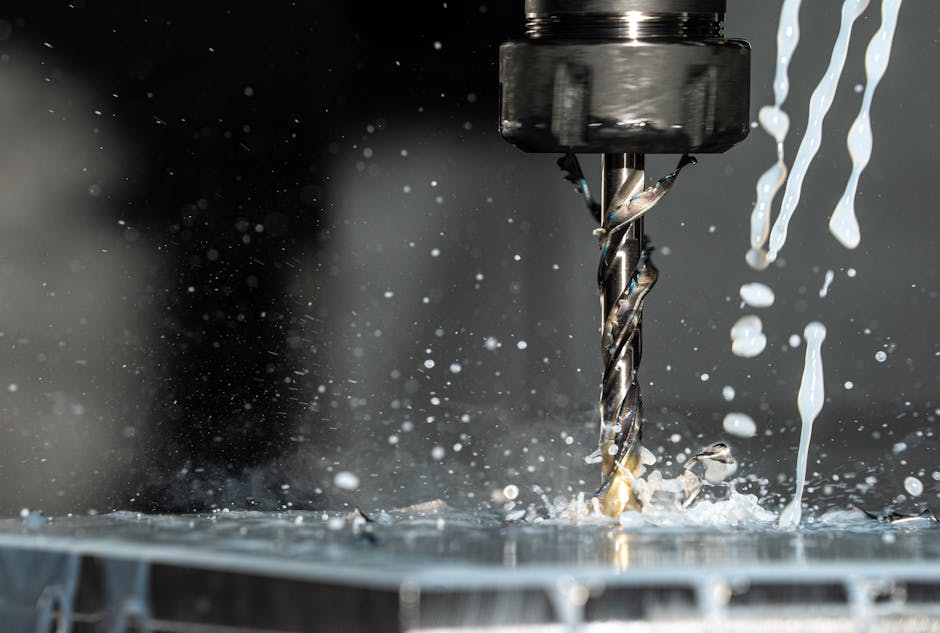Breakthroughs in Precision Machining Job Shops: Driving Innovation in UK Manufacturing
In recent years, the precision machining industry within the UK has experienced notable advancements, driven by technological breakthroughs and innovative strategies. This progress has not only revolutionised manufacturing processes but has also propelled the UK to the forefront of precision machining capabilities.
From the evolution of precision machining technology to the integration of artificial intelligence and machine learning, these breakthroughs have significantly impacted the landscape of UK manufacturing.
This paper delves into the pivotal developments in precision machining job shops and their role in propelling innovation within the UK manufacturing sector. By examining the evolution of CNC machining processes, the impact of automation and robotics, and forecasting future trends, this analysis aims to provide a comprehensive understanding of the transformative forces driving precision machining in the UK.
Key Takeaways
- Integration of advanced technologies such as artificial intelligence, IoT, and big data analytics is driving the evolution of precision machining technology in the UK manufacturing industry.
- CNC machining processes have seen advancements in programing, tooling, and smart technologies, resulting in higher accuracy, productivity, and quality control.
- Automation and robotics have led to increased efficiency, improved precision, enhanced safety, and cost savings in precision machining job shops.
- The integration of AI and machine learning enables real-time decision-making, predictive maintenance, higher precision levels, and operational excellence in the global market.
Evolution of Precision Machining Technology

How has precision machining technology evolved to meet the increasing demands of UK manufacturing?
The evolution of precision machining technology has been closely intertwined with the advancements brought about by Industry 4.0. This new era of industrial transformation has led to significant changes in the manufacturing landscape, prompting the need for more precise, efficient, and flexible production processes.
As a result, precision machining has undergone a remarkable evolution, embracing digitalisation, automation, and smart manufacturing principles. One of the key drivers of this evolution has been the integration of advanced technologies such as artificial intelligence, Internet of Things (IoT), and big data analytics into precision machining systems.
These technological integrations have enabled manufacturers to achieve higher levels of accuracy, productivity, and quality control. Moreover, the emergence of innovative tooling solutions has revolutionised precision machining, enabling the production of complex components with unprecedented levels of precision and surface finish.
In essence, the evolution of precision machining technology has been pivotal in empowering UK manufacturing to meet the escalating demands for high-quality, customised products within shorter lead times. By embracing Industry 4.0 principles and leveraging tooling innovations, precision machining has become a cornerstone of modern manufacturing, driving the industry towards greater efficiency and competitiveness.
Advancements in CNC Machining Processes

Amidst the technological advancements in precision machining, CNC machining processes have notably evolved to enhance precision, efficiency, and automation in UK manufacturing. CNC programing has seen significant progress, allowing for more complex and intricate designs to be accurately machined. This has been made possible through the use of advanced software that enables the generation of highly precise toolpaths, resulting in improved surface finishes and dimensional accuracy. Additionally, tooling advancements have played a pivotal role in the enhancement of CNC machining processes. The development of cutting-edge tool materials and coatings has significantly extended tool life, reducing the frequency of tool changes and downtime, thus increasing overall productivity. Furthermore, the integration of smart tooling technologies, such as sensor-imbedded tools, has enabled real-time monitoring of machining operations, leading to proactive tool maintenance and optimised machining parameters. These advancements in CNC machining processes have not only elevated the quality of machined components but have also contributed to the overall competitiveness of the UK manufacturing industry.
| Advancements in CNC Machining Processes | || ————————————— | ——————————– | ——————————————– || CNC Programing | Enhanced software for complex designs || Tooling Advancements | Cutting-edge materials and coatings || | Smart tooling technologies || | Real-time monitoring of operations |
Impact of Automation and Robotics

The integration of automation and robotics in precision machining job shops has revolutionised manufacturing processes, significantly enhancing productivity and efficiency in the UK manufacturing industry. This technological advancement has brought about several notable impacts:
-
Increased Efficiency: Robotic implementation has led to a significant reduction in production cycle times and enhanced overall operational efficiency.
-
Improved Precision: Automation has enabled the execution of complex machining tasks with a level of precision that was previously unattainable, resulting in higher quality outputs.
-
Enhanced Safety: Automated processes have contributed to a safer working environment by minimising the need for manual intervention in hazardous machining operations.
-
Cost Savings: Automation and robotics have led to reduced labour costs and an overall decrease in production expenses, thereby positively impacting the bottom line.
The utilisation of automation and robotics in precision machining job shops has not only transformed the manufacturing landscape but has also paved the way for further technological advancements. As we delve deeper into the topic, the next section will explore the integration of AI and machine learning in precision machining, showcasing the continuous evolution of manufacturing processes.
Integration of AI and Machine Learning

The integration of AI and machine learning into precision machining job shops further advances the technological landscape of UK manufacturing, fostering increased productivity and precision. AI applications enable machines to analyse and interpret complex data, facilitating real-time decision-making and process optimisation. By incorporating AI into machining processes, manufacturers can enhance operational efficiency and product quality.
One significant application of AI in precision machining job shops is predictive maintenance. Machine learning algorithms can analyse equipment performance data to predict potential failures, enabling proactive maintenance to prevent costly downtime. This predictive approach minimises unexpected breakdowns, extends machinery lifespan, and reduces maintenance costs. Moreover, AI-driven predictive maintenance helps job shops optimise production schedules, ensuring uninterrupted operations.
In the context of precision machining, machine learning algorithms can continuously improve accuracy and consistency by analysing performance data and making real-time adjustments. This capability enables manufacturers to achieve higher precision levels, reducing defects and rework. By harnessing AI and machine learning, UK manufacturing job shops can stay at the forefront of innovation, driving operational excellence and competitiveness in the global market.
Future Trends in Precision Machining

What are the upcoming technological advancements shaping the future of precision machining in UK manufacturing?
-
Industry 4.0 Integration: The future of precision machining in the UK will see a greater integration of Industry 4.0 technologies, enabling the seamless exchange of data and automation of manufacturing processes.
-
Digital Transformation: The industry is expected to undergo a significant digital transformation, with a focus on leveraging advanced digital technologies to optimise production processes and enhance overall efficiency.
-
Smart Factories: The emergence of smart factories will revolutionise precision machining, incorporating cyber-physical systems and the Internet of Things (IoT) to enable real-time monitoring and control of manufacturing operations.
-
Predictive Maintenance: Future trends indicate a shift towards predictive maintenance strategies, utilising machine learning and AI algorithms to anticipate and prevent equipment failures, thereby minimising downtime and enhancing productivity.
These trends reflect a paradigm shift in the precision machining industry, emphasising the adoption of advanced technologies to drive innovation and meet the increasing demands for efficiency and quality in UK manufacturing.
Frequently Asked Questions
What Are the Main Challenges Faced by Precision Machining Job Shops in the Uk?
Challenges faced by precision machining job shops in the UK include maintaining high quality amidst increasing demand, staying competitive in a global market, and adapting to rapidly evolving technologies to drive innovation in UK manufacturing.
How Do Precision Machining Job Shops in the UK Ensure Quality Control and Precision in Their Manufacturing Processes?
Ensuring quality control and precision in manufacturing processes, UK precision machining job shops employ advanced technology adoption and stringent quality assurance measures. From cutting-edge machinery to meticulous inspection protocols, these shops prioritise excellence in every component produced.
What Are the Typical Lead Times for Projects in Precision Machining Job Shops?
Typical lead times in precision machining job shops can vary based on project complexity and scope. Effective project management is crucial for meeting deadlines and ensuring timely delivery of high-quality machined components to clients.
How Do Precision Machining Job Shops in the UK Handle Customisation and Unique Project Requirements?
Customisation management in UK precision machining job shops involves meticulous planning, close collaboration with clients, and leveraging advanced technology. Unique project handling demands adaptable processes, skilled workforce, and a commitment to meeting diverse requirements with precision and efficiency.
What Are the Key Factors Influencing the Competitiveness of Precision Machining Job Shops in the Uk?
The competitiveness of precision machining job shops in the UK is influenced by factors such as technological advancements, skilled workforce, operational efficiency, and adherence to industry trends. Embracing innovation and staying abreast of market demands are critical to sustaining competitiveness.
Conclusion
In conclusion, the evolution of precision machining technology has paved the way for advancements in CNC processes, automation, robotics, and the integration of AI and machine learning. These breakthroughs have driven innovation in UK manufacturing, leading to increased efficiency, accuracy, and productivity.
As the adage goes, ‘necessity is the mother of invention,’ and it is clear that the necessity for precision in manufacturing has sparked incredible technological advancements in the industry.
Contact us to discuss our services now!
